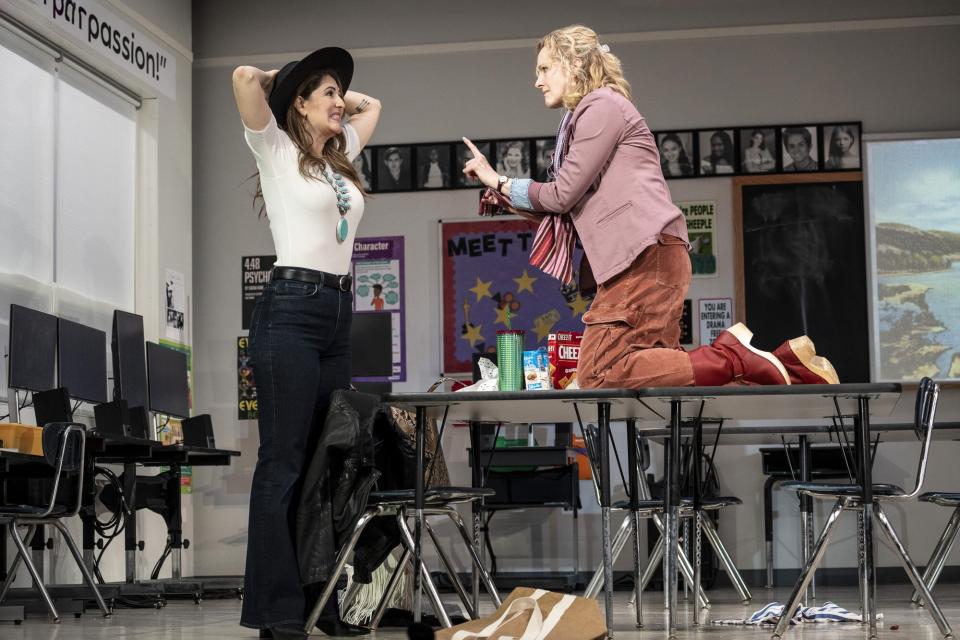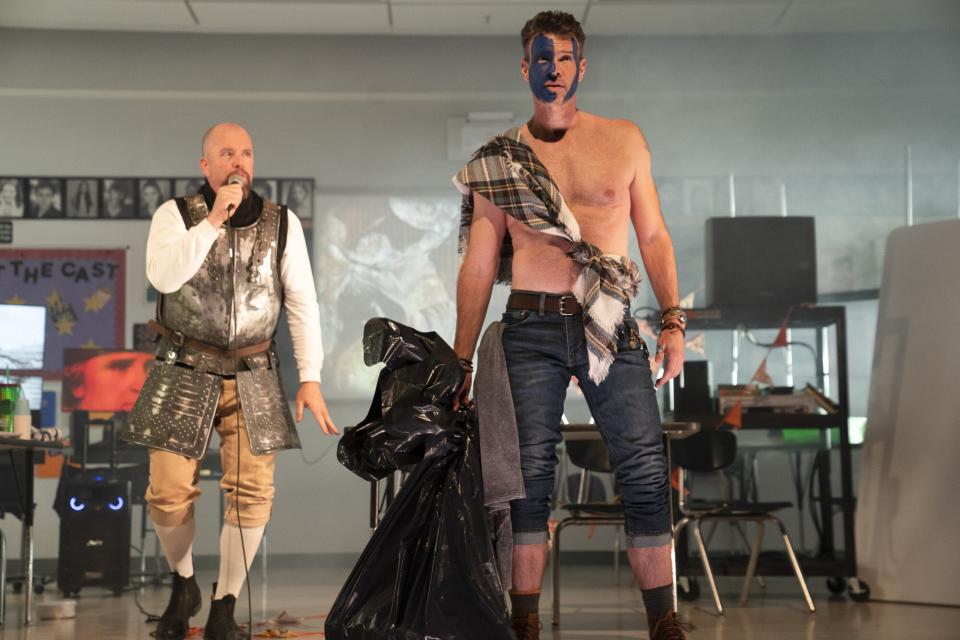The Thanksgiving Play review: D'Arcy Carden shines in blistering satire of well-meaning white artists

What exactly does Thanksgiving mean? For most Americans, it means spending the fourth Thursday in November hanging out with family, eating a lot of food, and watching football — maybe the parade and dog show, too, for those who can wake up early enough. But Thanksgiving also comes with its own narrative about peaceful coexistence between white settlers and Native Americans. At this point, most of us know that narrative to be outrageously simplistic if not downright false — if the Natives really did provide pilgrims with life-sustaining food, their generosity was repaid with genocide and theft.
So what, then, do we do with the traditional Thanksgiving story? That is the subject of The Thanksgiving Play, opening this week at Broadway's Hayes Theater after years of workshops around the country. All that work has allowed playwright Larissa FastHorse to refine her blistering satire of well-meaning white people to a sharp edge.

Joan Marcus D'Arcy Carden and Katie Finneran in 'The Thanksgiving Play'
The Thanksgiving Play is an intimate affair, involving only four characters on stage: Logan (Katie Finneran), a schoolteacher who wants to put on a culturally appropriate play about Thanksgiving for her students; Jaxton (Scott Foley), her lover who is politically correct to a fault; Caden (Chris Sullivan), a fellow teacher and academic who has written many plays with no idea how to stage them; and Alicia (D'Arcy Carden), a beautiful actress hired by Logan who is under the false impression that she has Native American heritage.
Logan and Jaxton seemingly want to do something positive for their students by putting on an educational, culturally sensitive theater experience, but their refusal to recognize their own limitations leads them to strange places. When they realize they don't actually have any actors of Native heritage, they decide the best course of action is to not include any Native characters rather than presume to speak for them — but is that really culturally sensitive? When they try to tell a Thanksgiving story with only white characters, they inevitably end up celebrating violence. These characters' good intentions are not the subject of FastHorse's satire, but rather their cringe-inducing arrogance.
Since The Thanksgiving Play is entirely about producing a play, it's full of inside jokes that may only land with fellow creatives. The production design includes a poster for 4.48 Psychosis, Sarah Kane's suicidal play that Logan apparently put on for her students, and a photograph of absurdist playwright Samuel Beckett. These signal that Logan is probably not as sensitive to the needs and desires of her students as she thinks, but may fly over some audience members' heads — as will the whole concept of actors "devising" a play together. But everyone can chuckle at the wannabe-inspirational quote plastered on the wall without attribution, declaring "The human race is filled with passion!"

Joan Marcus Chris Sullivan and Scott Foley in 'The Thanksgiving Play'
Refreshingly, the creative process among the characters is occasionally broken up by short videos featuring child actors (credited as Mollie Fink, Dashan Turner, Ishan De Silva, and Atticus Scott-Williams) acting out pieces of Thanksgiving propaganda. These video clips play as if directed by Wes Anderson's deranged doppelganger, and manage to be both hilarious and chilling — even if they signal that The Thanksgiving Play might work better as a movie or full-on multimedia production in the future.
The primary takeaway from The Thanksgiving Play is not that white people shouldn't acknowledge historical injustice perpetuated by their ancestors, but rather that there really are some stories that certain people can't tell. That doesn't mean those people shouldn't make other stories! Caden works really hard to write a historically accurate depiction of the origins of Thanksgiving, but when his lines of dialogue are read by Alicia, they come off like scenes from a sex comedy — which, the characters eventually admit, probably would play better to their juvenile audience than ham-fisted apologia!
Carden is absolutely hilarious as the airheaded Alicia. Considering that she first rose to prominence playing the omniscient artificial intelligence Janet on The Good Place, the role really shows off her range. Sullivan makes Caden's insistence on correcting uses of the term "pilgrims" with "well, they called themselves Separatists" funnier every time, Foley admirably keeps a straight face while demonstrating how his character's sensitivity can so easily run all the way back around to ignorance, and Finneran gets more and more hilariously frazzled as Logan's goals collapse around her.
The next Thanksgiving is more than half a year away at this point, but the questions posed by The Thanksgiving Play are worth pondering at any time. Grade: B+
Related content:

